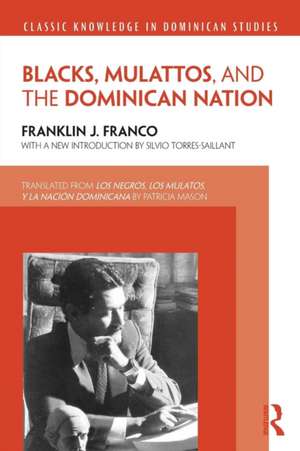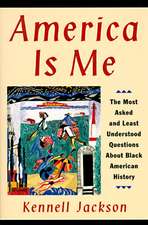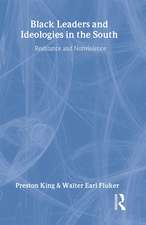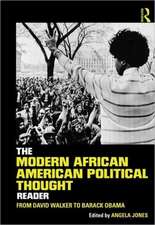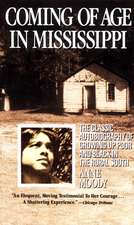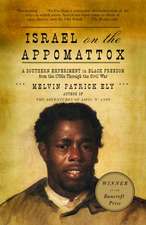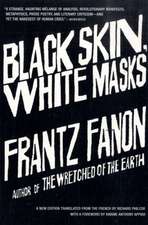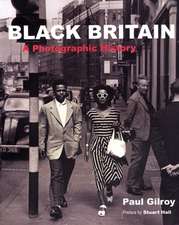Blacks, Mulattos, and the Dominican Nation: Classic Knowledge in Dominican Studies
Autor Franklin Francoen Limba Engleză Paperback – 8 mai 2015
This translation includes a new introduction by Silvio Torres-Saillant (Syracuse University) which contextualizes Franco's work, explaining the milieu in which he was writing, and bringing the historiography of race, slavery, and the Dominican Republic up to the present. Making this pioneering work accessible to an English-speaking audience for the first time, this is a must-have for anyone interested in the lasting effects of African slavery on the Dominican population and Caribbean societies.
| Toate formatele și edițiile | Preț | Express |
|---|---|---|
| Paperback (1) | 405.66 lei 6-8 săpt. | |
| Taylor & Francis – 8 mai 2015 | 405.66 lei 6-8 săpt. | |
| Hardback (1) | 996.65 lei 6-8 săpt. | |
| Taylor & Francis – 19 mai 2015 | 996.65 lei 6-8 săpt. |
Preț: 405.66 lei
Nou
Puncte Express: 608
Preț estimativ în valută:
77.62€ • 81.25$ • 64.61£
77.62€ • 81.25$ • 64.61£
Carte tipărită la comandă
Livrare economică 31 martie-14 aprilie
Preluare comenzi: 021 569.72.76
Specificații
ISBN-13: 9781138785007
ISBN-10: 1138785008
Pagini: 130
Ilustrații: 4 black & white tables
Dimensiuni: 152 x 229 x 8 mm
Greutate: 0.2 kg
Ediția:1
Editura: Taylor & Francis
Colecția Routledge
Seria Classic Knowledge in Dominican Studies
Locul publicării:Oxford, United Kingdom
ISBN-10: 1138785008
Pagini: 130
Ilustrații: 4 black & white tables
Dimensiuni: 152 x 229 x 8 mm
Greutate: 0.2 kg
Ediția:1
Editura: Taylor & Francis
Colecția Routledge
Seria Classic Knowledge in Dominican Studies
Locul publicării:Oxford, United Kingdom
Public țintă
Postgraduate and UndergraduateCuprins
Series Editor’s Introduction
Introduction to Franklin Franco’s Blacks, Mulattos, and the Dominican Nation Silvio Torres-Saillant
Prologue Juan I. Jiménez Grullón
1. The Black Population
2. The Black Population and the National Consciousness
3. The Constitution of 1801
4. The Other Face of the Reconquest
5. "Foolish Spain" and "Rebellious Africa"
6. Complete Unity and National Unity
Bibliography
Introduction to Franklin Franco’s Blacks, Mulattos, and the Dominican Nation Silvio Torres-Saillant
Prologue Juan I. Jiménez Grullón
1. The Black Population
2. The Black Population and the National Consciousness
3. The Constitution of 1801
4. The Other Face of the Reconquest
5. "Foolish Spain" and "Rebellious Africa"
6. Complete Unity and National Unity
Bibliography
Recenzii
"Finally! U.S. scholars and students interested in a fuller, more complex understanding of blackness in the Americas will have English-language access to Franklin J. Franco’s seminal account. Blacks, Mulattos and the Dominican Nation is indispensable reading for anyone interested in the relationship between slavery-based capitalism, competing colonial projects, and the development of racial systems and ideologies in the Americas. As importantly, Blacks, Mulattos and the Dominican Nation reminds readers that anti-Haitianism and negrophobia provide as much evidence of unremitting black freedom struggles on the island, as of the pathologies of white supremacy in the Hispanic Caribbean."
— Ginetta E. B. Candelario, author of Blacks behind the Ears: Dominican Racial Identity
"Franco’s classic study positions blackness as central to the evolution of Dominican national identity, and demonstrates the challenges black freedom and equality posed in the development of both popular and elite notions of citizenship."
— Glenn Chambers, author of Race, Nation, and West Indian Immigration to Honduras, 1890-1940
"The reissue of Franklin Franco’s Blacks, Mulattos and the Dominican Nation demands a new look at the African base of the Dominican Republic, and the vexed question of race in that country. It brings to light long held silences of racial oppression, and turns accepted notions of history on its head. At a time of deep misgiving between the Dominican Republic and Haiti, the book reveals a fascinating account of the impact of Toussaint Loverture’s presence in the Dominican Republic and his contribution to the development of a consciousness of the Dominican nation. This is a must read for Caribbean scholars."
— Linden F. Lewis, Presidential Professor of Sociology at Bucknell University, past President of the Caribbean Studies Association and editor of the anthology Caribbean Sovereignty, Development and Democracy in an Age of Globalization
"Franklin J. Franco’s analysis challenged the idea that Hispanic benevolence birthed racial harmony when he made enslaved people, violence, and plunder central to Hispaniola’s colonial history. Franco can now assume his well-earned place among English-language scholars who broke new ground in the study of slavery and the African Diaspora in the Americas."
— April J. Mayes, author of The Mulatto Republic: Class, Race and Dominican National Identity
"Written in 1969, Franklin Franco’s book remains an important synthesis of Dominican history during the colonial and Haitian periods. It illuminates Santo Domingo’s place as an extraordinary part of the Afro-Caribbean world: its role as the first slave plantation society in the Americas (in the 1500s); its mostly enslaved, maroon, and African-descended population since that time; and its political integration with Haiti, which was embraced by many Dominicans as a more liberal and modern nation during the early 1800s. A new introduction by Silvio Torres-Saillant situates this classic work beautifully and expansively in Dominican historiography."
— Richard Turits, author of Foundation of Despotism: Peasants, the Trujillo Regime, and Modernity in Dominican History
— Ginetta E. B. Candelario, author of Blacks behind the Ears: Dominican Racial Identity
"Franco’s classic study positions blackness as central to the evolution of Dominican national identity, and demonstrates the challenges black freedom and equality posed in the development of both popular and elite notions of citizenship."
— Glenn Chambers, author of Race, Nation, and West Indian Immigration to Honduras, 1890-1940
"The reissue of Franklin Franco’s Blacks, Mulattos and the Dominican Nation demands a new look at the African base of the Dominican Republic, and the vexed question of race in that country. It brings to light long held silences of racial oppression, and turns accepted notions of history on its head. At a time of deep misgiving between the Dominican Republic and Haiti, the book reveals a fascinating account of the impact of Toussaint Loverture’s presence in the Dominican Republic and his contribution to the development of a consciousness of the Dominican nation. This is a must read for Caribbean scholars."
— Linden F. Lewis, Presidential Professor of Sociology at Bucknell University, past President of the Caribbean Studies Association and editor of the anthology Caribbean Sovereignty, Development and Democracy in an Age of Globalization
"Franklin J. Franco’s analysis challenged the idea that Hispanic benevolence birthed racial harmony when he made enslaved people, violence, and plunder central to Hispaniola’s colonial history. Franco can now assume his well-earned place among English-language scholars who broke new ground in the study of slavery and the African Diaspora in the Americas."
— April J. Mayes, author of The Mulatto Republic: Class, Race and Dominican National Identity
"Written in 1969, Franklin Franco’s book remains an important synthesis of Dominican history during the colonial and Haitian periods. It illuminates Santo Domingo’s place as an extraordinary part of the Afro-Caribbean world: its role as the first slave plantation society in the Americas (in the 1500s); its mostly enslaved, maroon, and African-descended population since that time; and its political integration with Haiti, which was embraced by many Dominicans as a more liberal and modern nation during the early 1800s. A new introduction by Silvio Torres-Saillant situates this classic work beautifully and expansively in Dominican historiography."
— Richard Turits, author of Foundation of Despotism: Peasants, the Trujillo Regime, and Modernity in Dominican History
Descriere
Blacks, Mulattos, and the Dominican Nation is the first English translation of the classic text Los negros, los mulatos y la nación dominicana by esteemed Dominican scholar Franklin J. Franco. Published in 1969, this book was the first systematic work on the role of Afro-descendants in Dominican society, the first society of the modern Americas where a Black-Mulatto population majority developed during the 16th century. Franco’s work, a foundational text for Dominican ethnic studies, constituted a paradigm shift, breaking with the distortions of traditional histories that focused on the colonial elite to place Afro-descendants, slavery, and race relations at the center of Dominican history.
This translation includes a new introduction by Silvio Torres-Saillant (Syracuse University) which contextualizes Franco's work, explaining the milieu in which he was writing, and bringing the historiography of race, slavery, and the Dominican Republic up to the present. Making this pioneering work accessible to an English-speaking audience for the first time, this is a must-have for anyone interested in the lasting effects of African slavery on the Dominican population and Caribbean societies.
This translation includes a new introduction by Silvio Torres-Saillant (Syracuse University) which contextualizes Franco's work, explaining the milieu in which he was writing, and bringing the historiography of race, slavery, and the Dominican Republic up to the present. Making this pioneering work accessible to an English-speaking audience for the first time, this is a must-have for anyone interested in the lasting effects of African slavery on the Dominican population and Caribbean societies.
